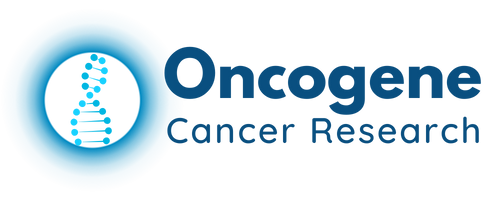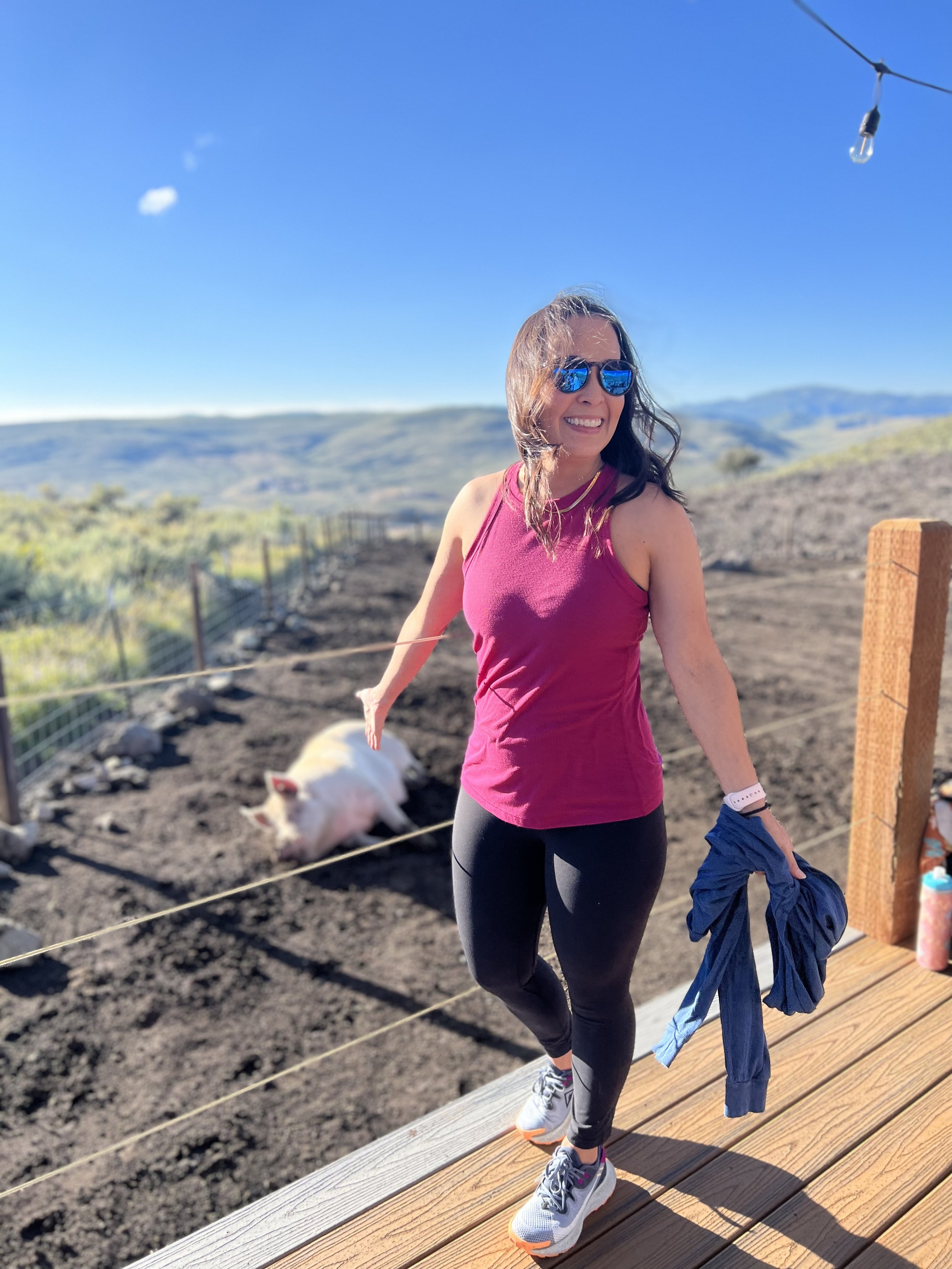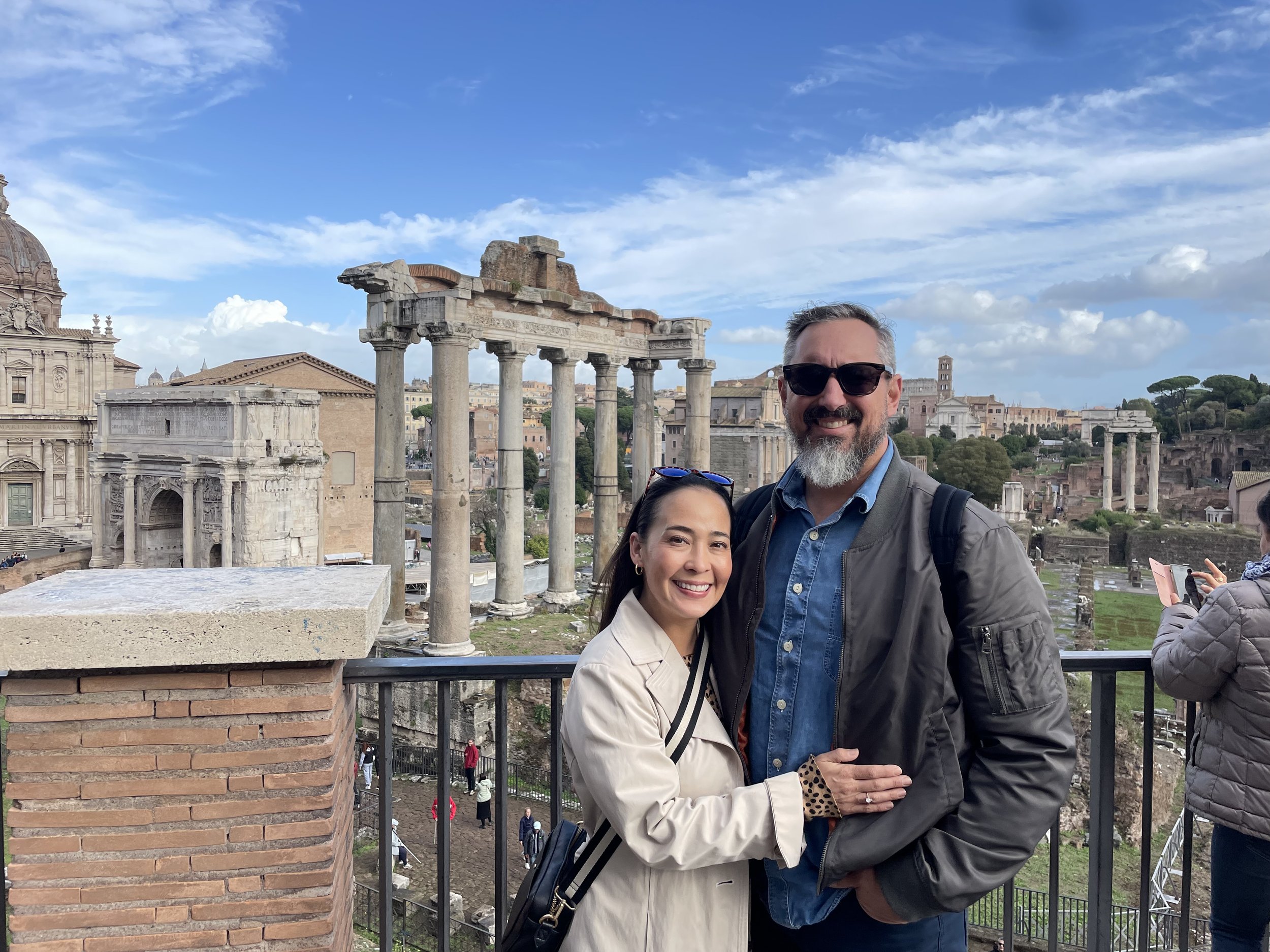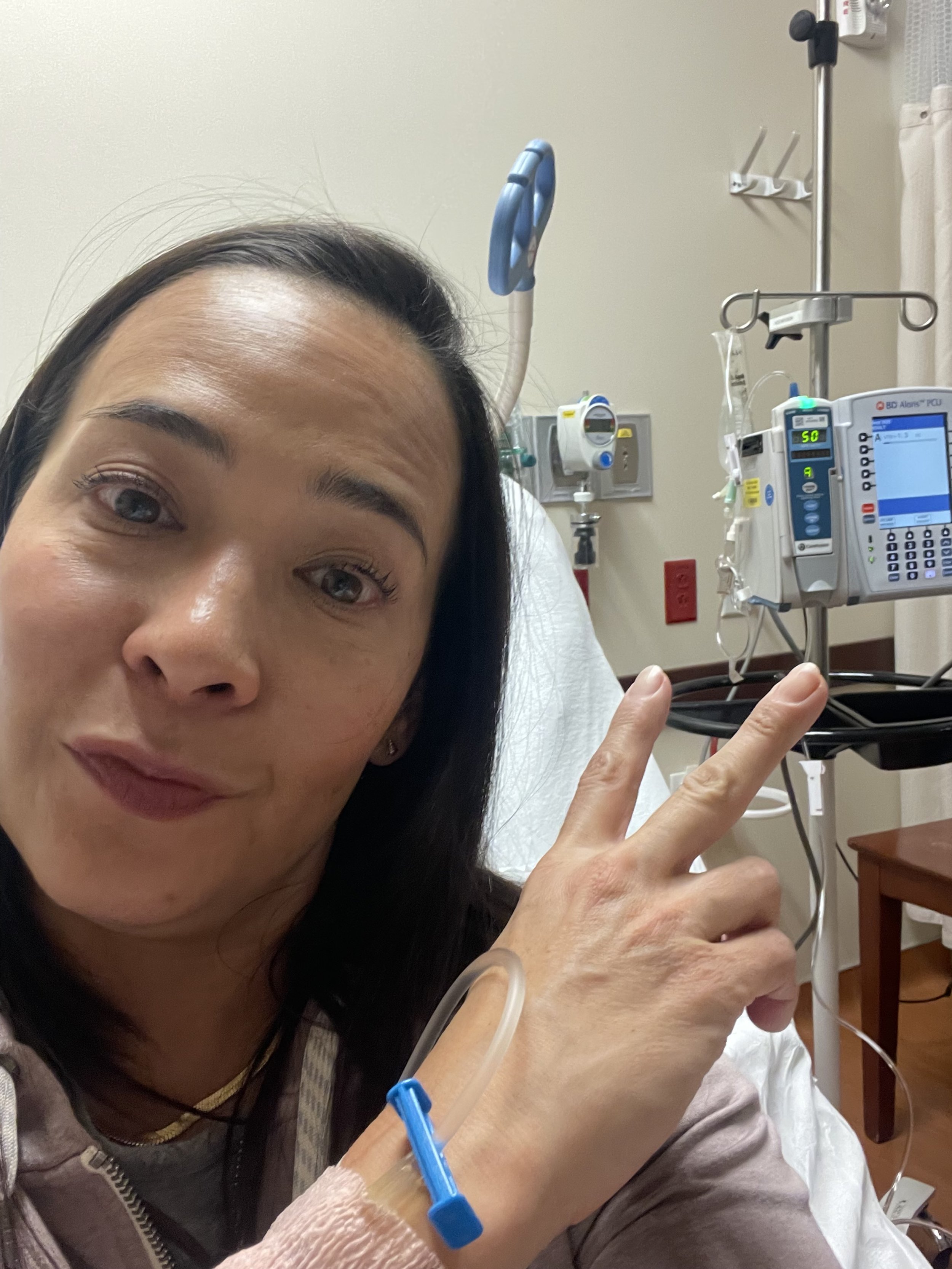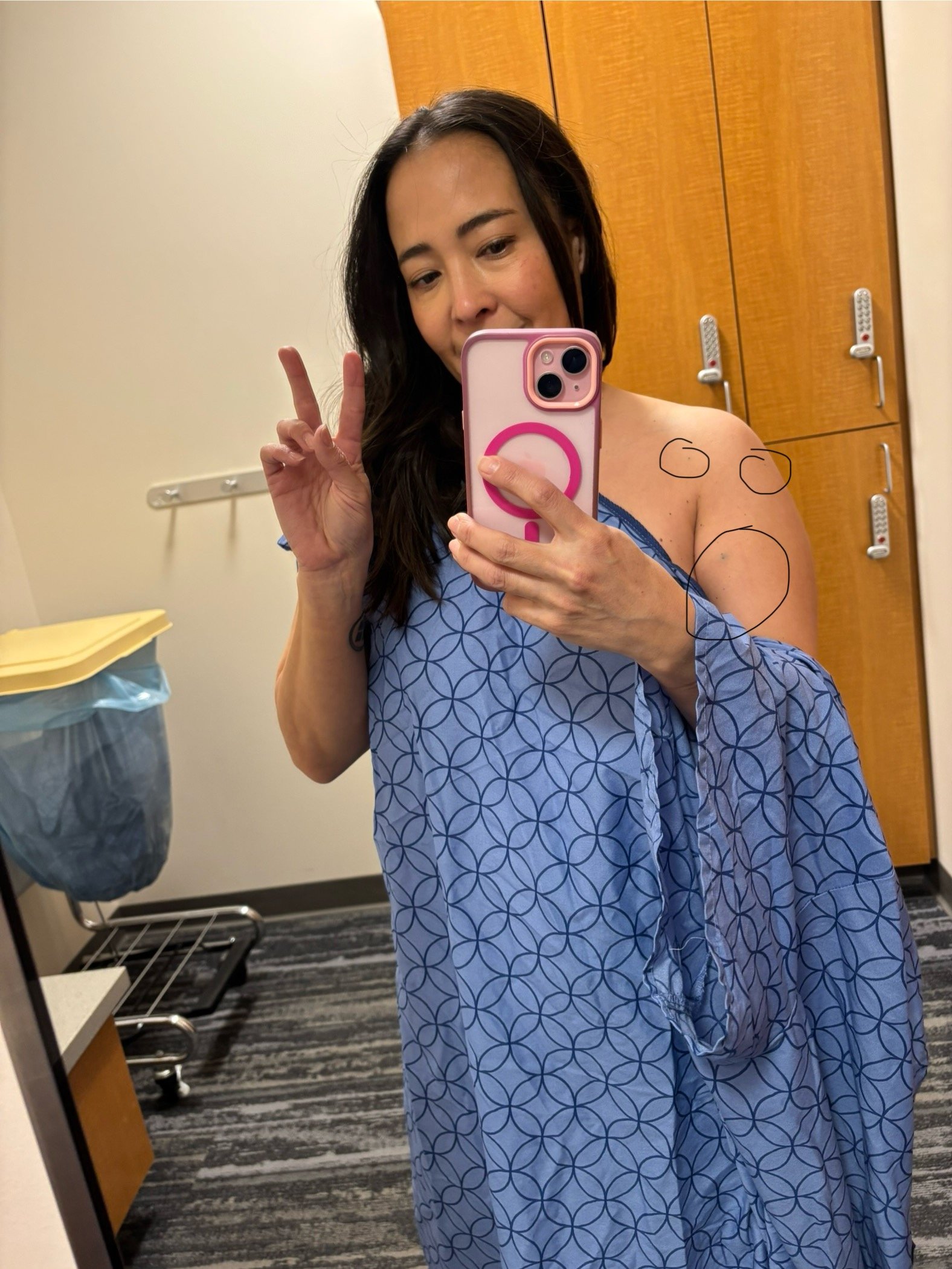Patient stories.
Get real stories of people living with lung cancer.

I thought I’d pulled a muscle in my back during hot yoga. It was my lung cancer - already in my brain and bones.
— Allison Zarkos (R) from Utah in the USA - diagnosed with stage 4 ALK+ lung cancer age 45
Meet Allison.
From hot yoga to hospital scans: excruciating back pain revealed healthy mother’s shocking lung cancer
My first thought was I must have pulled a muscle in my back. Lung cancer was no where in my mind.
The morning Allison bent over in her hot yoga class and couldn't stand back up, she thought she'd pulled a muscle. It was December 2022, and the 45-year-old mother of two was at the peak of her game – skiing, hiking, biking, working out five days a week while juggling volunteer work on multiple boards in her Park City, Utah community.
Alison with her husband"I was like, that's so weird," she recalls of that moment when her back seized. "I must have pulled a muscle."
What followed was six months of massage therapy, chiropractic work, and the kind of alternative treatments active people often turn to when their bodies betray them. Allison remained functional – she could still ski with some pain, still travel – but something deeper was wrong. Her back ached in ways she'd never experienced.
"I thought maybe this is just my body getting older," she says, her voice carrying the weight of hindsight.
By May 2023, the pain had become excruciating. Her husband had to carry her to the bathroom one night. Both knew something was seriously wrong.
The call that changes everything
The X-ray showed a partially compressed L4 vertebra. The CT scan revealed something far more devastating: lesions throughout her spine. When the urgent care doctor called her in the Friday before the US Mother's Day, Allison almost brought her daughter along – her 11-year-old was interested in medicine, and they had planned to run errands together afterward.
Instead, she found herself sitting across from a doctor asking, "How do you feel otherwise?"
"Well, I mean, I'm a little tired, but other than that, like, I'm a mother. And I'm tired," Allison replied, not yet understanding that her world was about to shift completely.
"The scan shows that there are lesions in your spine," the doctor said gently.
Allison read the report herself afterward. The words "concerning for metastatic lesions" jumped off the page. Having worked in a hospital for over a decade, with a nurse practitioner sister, she knew exactly what that meant.
"I called my husband, and I could barely speak," she remembers. "I told him that it wasn’t a slipped disc after all."
Alison and familyRacing against time
What followed was a whirlwind of appointments, specialists, and the kind of medical choreography that happens when cancer is suspected. Within weeks, Allison had a biopsy of a lymph node. By June 7, she had her answer: adenocarcinoma lung cancer.
But there was more. The cancer had spread throughout her bones. Her doctors described it as "diffuse"— so widespread they didn't bother counting the bone lesions. Overall, the cancer went from her femur and to her brain and there were small spots dotting her liver.
"We were in complete shock," Allison says. "But I think we knew just enough that they knew there were these biomarkers out there and that they were treatable, but we didn't know the details."
On June 15, Allison received the news that would save her life: she was ALK-positive, carrying a genetic mutation that made her cancer treatable using a targeted therapy.
The drug that works like magic
Instead of chemotherapy, hair loss, and the traditional cancer treatment journey, Allison was handed a bottle of pills – alectinib, a targeted therapy designed specifically for her type of cancer.
"If you didn't have a targeted therapy," her first oncologist told her bluntly, "we would be walking you down the hall and checking you in for chemotherapy. And you might not have left."
The treatment response was almost immediate. Within a week, Allison could sleep on her left side again. The rib pain vanished. The swallowing difficulties disappeared.
"I was like, OK, yes, we've got this," she recalls.
But then came the rash – a full-body eruption that covered her from toes to face. For two terrifying weeks, she wondered if her body was rejecting the one treatment that could save her life.
"It was awful," she says. "I think the worst part was thinking I'm having an allergic reaction or my body's not accepting the drugs."
Life in the new normal
After managing the rash with steroids and dosing changes, Allison settled into what she calls her "new normal." For 18 months, the alectinib worked beautifully. Scans showed tumours shrinking, disappearing, becoming inactive. Her primary tumour became tiny. The brain lesions vanished within six weeks.
She returned to her volunteer work, helping organize major fundraising events in Park City. She travelled to Japan with her sister, completing a 12-day hiking pilgrimage from temple to temple. She watched her daughter place second in the nation in snowboarding slopestyle. She also has supported her son through his junior year, multiple AP (advanced placement) exams, taking on new jobs and watching him go to prom. Ultimately, she’s been enjoying life to its fullest.
"Part of me is happy that my kids treat me as if I don't have cancer because there's no difference now with how I look and feel," she says.
But cancer, as many patients learn, is a cunning adversary. In August 2024, Allison's shoulder began to hurt. She initially thought the pain was related to the regular Zometa infusions to strengthen her bones. Scans eventually revealed that while everything else remained stable, the cancer had found a way around her medication in that one spot.
Alison hiking in JapanThe second mountain to climb
The development of progression made Allison curious. She requested her full biomarker report and learned she has ALK variant 3 and the TP53 co-mutation and that her resistance was driven by the G1202R mutation. Switching to lorlatinib, a third-generation ALK inhibitor, in January 2025 brought new challenges – even more weight gain, neuropathy in her fingertips and elevated cholesterol requiring a statin. But it also brought new hope. Within months, even the resistant tumour in her shoulder was responding. Allison also underwent radiation to the shoulder to treat the pain and spot. As the pain lifted, so did her spirits.
"Sometimes I feel like a walking science experiment," she jokes. "The neuropathy is strange… My finger tips are numb. When I scratch my head, I can’t even feel my hair. But my energy levels are so much better. I’ll take this over the alternatives.”
Living with gratitude and purpose
Today, Allison describes her life as feeling "very normal" most of the time. She's back to hiking with her husband and dog every morning, back to her community work, back to being the kind of active, engaged person she always was.
But there's a difference now – a heightened awareness of what matters.
"Every little thing is just so meaningful," she reflects. "I'm so grateful to walk out for those hikes every morning. I love this. I'm so happy and feel so much gratitude."
She's added acupuncture to her routine, invested in a weighted vest for her treadmill walks, and discovered the healing power of saunas and cold plunges. She's learned to eat in ways that honour her Japanese heritage, finding that traditional Asian foods help her feel better and better control her weight.
Most importantly, she's learned to advocate for herself in ways she never had to before.
Alison with her sisterThe advocate emerges
Allison has added a renowned ALK expert to her care team to work alongside her local oncologist. She's also currently exploring surgery to remove her primary tumour. And she’s joined a pharmaceutical’s patient advisory board to help them better understand the patient experience.
"Be your biggest advocate," she advises other newly diagnosed patients. "It sounds so cliché, but it really is because my doctor here, is willing to work alongside my ALK expert and put what he recommends into place."
Her journey has taught her that being a "good patient" sometimes means pushing for more —more testing, more options, more aggressive treatment.
The research that gives hope
Two years into her diagnosis, Allison is acutely aware that she's already on her second line of therapy. The reality of drug resistance weighs on her, even as she celebrates her current stable scans.
"The day I was diagnosed, my sister found and put me onto the ALK Positive organisation’s website," Allison recalls. "It shaped my perspective. After all, if ALK Positive thinks we can make this a chronic disease, then I'm going to live."
She's encouraged by collaborative research efforts and the growing understanding of ALK-positive lung cancer. The ALK Positive organization, she says, has been a lifeline from day one. She strongly believes we need more research for all lung cancers.
I have a lot to live for.
The view from here
Standing in her Park City home, thinking about the mountains where she once skied without a care in the world, Allison embodies a new kind of strength. She's learned to be gentler with her body while still pushing its limits. She's discovered that taking care of herself isn't selfish – it's essential.
"I feel like I'm allowed to put my health and wellness at the top because it is important for my overall survival," she says.
Her teenage children, now 17 and 14, have adapted too. They've learned to help more around the house when she has had a tough week of treatments. They've seen their mother model resilience, advocacy, and the art of living fully within constraints.
Allison's story continues at three-month scan intervals, with morning hikes, community service, and the quiet daily miracle of ordinary moments made extraordinary by their very existence. As Allison looks toward the future, she carries both the uncertainty that comes with any cancer diagnosis and the profound gratitude that comes with effective treatment. She's learned that you can't plan your way out of cancer, but you can choose how to live with it.
"I have a lot to live for," she says simply. In the mountains of Utah, she's found that some peaks are conquered not by climbing them, but by being empowered with information and learning to live gracefully alongside them.
June 2025

